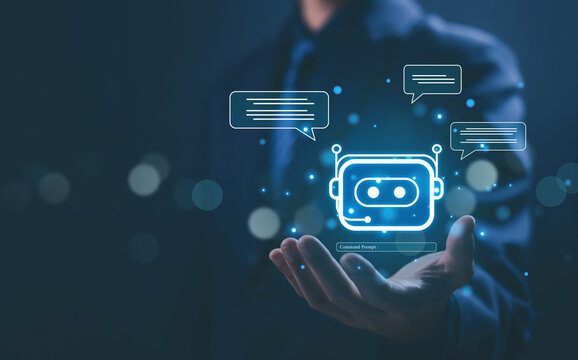How Enterprise AI Chatbots Are Replacing Legacy Systems with Smart Conversations
 Michael Johnson
Michael JohnsonLegacy systems have been the backbone of enterprise operations for decades. From mainframe software and traditional CRMs to siloed communication platforms, these systems have supported everything from HR processes to customer service. But as technology evolves and business expectations accelerate, these old systems are rapidly showing their limitations. They are inflexible, costly to maintain, and often lack integration capabilities that modern businesses require. Enter the era of enterprise AI chatbot development services, where smart, conversational interfaces are not just supplementing but outright replacing legacy enterprise systems.

Across industries, companies are turning to intelligent chatbots to modernize how information flows and how tasks are completed. Instead of navigating through outdated dashboards or waiting in queues for human support, users can now simply ask questions, request actions, and receive intelligent, context-aware responses in real time. This transition is a powerful shift from static, rules-based interfaces to dynamic, conversational experiences powered by artificial intelligence.
The Shortcomings of Legacy Systems in a Digital-First World
Legacy systems are often deeply embedded in enterprise infrastructure. They were built for reliability and stability, not agility. Many of these systems still rely on batch processing, lack API connectivity, and require expensive maintenance or vendor support. As businesses become more digital, mobile-first, and customer-centric, these outdated platforms can no longer keep up.
Employees find them cumbersome to use. Customers find them frustrating to interact with. Executives find them too rigid to adapt to new business models or market demands. This is where chatbot development supported by AI offers a modern alternative. By deploying intelligent, conversational interfaces, enterprises can bypass the outdated workflows of legacy systems and interact directly with data and functionality in a natural, efficient manner.
How Smart Conversations Are Taking Over Enterprise Workflows
Modern enterprise AI chatbot development service providers create solutions that act as conversational front-ends to multiple enterprise systems. Instead of logging into a legacy HR portal to request leave or generate reports, employees can now simply message a chatbot and get it done in seconds. Similarly, customers can check order statuses, update personal information, or troubleshoot problems without needing to access outdated customer portals or call centers.
These chatbots are driven by natural language understanding (NLU) and context-aware reasoning, making interactions fluid and human-like. They don’t just retrieve data; they understand what users need and take actions accordingly whether it’s scheduling a meeting, creating a task, or escalating a ticket.
This kind of intelligence is a product of advanced AI development that merges natural language processing with enterprise integration, decision trees, and machine learning. It’s not just about automation; it’s about conversation that drives results.
Integration with Legacy Systems – A Transitional Approach
Replacing legacy systems doesn’t always happen overnight. Smart enterprises are leveraging enterprise AI chatbot development services to create a transition layer where chatbots are integrated on top of legacy platforms via APIs, webhooks, or middleware. This means that instead of rebuilding from scratch, businesses can gradually modernize their interfaces while still utilizing existing data and infrastructure.
For instance, a logistics company using an old inventory management system can implement a chatbot that fetches real-time inventory levels through API calls, presents it in a conversational interface, and even suggests order replenishments based on trends. This enables the business to maintain the legacy system's backend while modernizing the user experience on the frontend.
In this way, custom software development becomes essential in connecting the dots writing the connectors, creating secure channels for data exchange, and optimizing responses from complex backend systems to conversational formats.
Enhancing Customer Experience with Conversational AI
Customer service has always been one of the most noticeable bottlenecks in legacy systems. Traditional call centers and email support models cannot scale effectively and are prone to human error, long wait times, and inconsistent service quality. Replacing this outdated infrastructure with enterprise-grade AI chatbots transforms how support is delivered.
A customer interacting with a chatbot development solution powered by AI can receive instant answers to common questions, access personalized assistance based on their history, and even complete transactions all without needing a human agent. These smart conversations can handle complex queries, hand off to human agents when necessary, and ensure continuity across channels.
For enterprises that rely on app development or web development, chatbots can be embedded directly into mobile apps and websites, providing real-time, round-the-clock support. This leads to higher customer satisfaction, lower churn rates, and measurable improvements in support efficiency.
Boosting Internal Operations and Employee Productivity
Legacy enterprise tools often slow down internal processes. Employees waste valuable time searching for information, filling out repetitive forms, or navigating outdated interfaces. With the implementation of intelligent chatbots, these everyday tasks become frictionless.
Need to schedule a meeting, find a policy document, or generate a sales report? An AI chatbot can handle all of it. These bots are built to operate within enterprise ecosystems whether it’s Slack, Microsoft Teams, or custom portals allowing for seamless, conversational access to mission-critical tasks.
The right enterprise AI chatbot development company can help build virtual assistants for HR, IT, finance, and sales departments. These assistants not only automate repetitive tasks but also guide employees through complex workflows, reducing errors and improving adoption of enterprise tools.
By replacing legacy task management systems with conversational workflows, organizations unlock speed, agility, and a better employee experience.
Enterprise-Grade AI Built for Scalability and Security
One of the key concerns enterprises face when replacing legacy systems is the issue of security and compliance. Traditional systems, while outdated, are often compliant with regulatory frameworks and have established governance models. Transitioning to new technology must not compromise data privacy or business continuity.
This is why selecting a qualified enterprise AI chatbot development company becomes crucial. The best companies build with enterprise security in mind implementing data encryption, access controls, audit logs, and adherence to GDPR, HIPAA, or other industry-specific regulations.
They also ensure scalability. As usage grows across regions, departments, and functions the AI chatbot should be able to handle increased load, connect with more systems, and expand its knowledge base. Whether deployed via cloud, hybrid, or on-premises environments, scalability ensures that the smart conversation layer continues to deliver high performance across the organization.
Replacing Legacy Interfaces in Customer-Facing Applications
In customer-facing use cases such as banking apps, healthcare portals, and e-commerce platforms the presence of legacy UI/UX frameworks can be a major conversion killer. Users today expect speed, personalization, and instant responses.
AI chatbots integrated through app development or web development processes can serve as conversational UI layers that mask the complexities of backend systems. For instance, a banking chatbot can allow customers to transfer funds, check balances, or raise fraud alerts without needing to go through multiple steps on a clunky app.
This transformation not only modernizes the user experience but also reduces reliance on call centers and manual interventions. Over time, enterprises begin to phase out the legacy interfaces and transition entirely to AI-powered systems that offer better usability and performance.
Future-Proofing Enterprise Technology with Conversational AI
The shift from legacy systems to smart conversations isn’t just a trend it’s a strategic imperative. As technologies like generative AI, voice recognition, and predictive analytics evolve, the capabilities of chatbots will only expand. Enterprises that embrace this transition today are setting themselves up for a competitive future.
They’re building systems that are adaptive, responsive, and aligned with how people actually communicate. And they’re doing so with the help of reliable enterprise AI chatbot development services that combine deep technical expertise with industry-specific knowledge.
By modernizing through smart conversations, enterprises are not only cutting operational costs but also unlocking new opportunities for customer engagement, employee productivity, and digital transformation.
Conclusion
Legacy systems served their purpose, but the future belongs to intelligent, conversational solutions. Replacing outdated platforms with smart, AI-driven chatbots enables enterprises to become more agile, customer-centric, and efficient. These chatbots, when developed by a top-tier enterprise AI chatbot development company, are capable of understanding human language, integrating deeply with business systems, and delivering seamless experiences across multiple channels.
Whether it’s through custom software development, AI development, app development, or web development, this technological transformation is reshaping how enterprises operate at every level. The shift isn’t just about tools it’s about how enterprises communicate, solve problems, and scale innovation in a digital-first world.
Subscribe to my newsletter
Read articles from Michael Johnson directly inside your inbox. Subscribe to the newsletter, and don't miss out.
Written by
